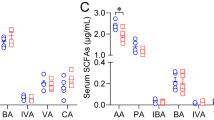Abstract
Fat type in diet is responsible for specific changes in gut microbiota (GM). Extra virgin olive oil (EVOO) has been shown to be beneficial for blood pressure and to produce effects on GM. To analyze the cause-effect relationship between intestinal microbial changes and blood pressure, we studied the effect of EVOO on fecal microbiota and systolic blood pressure (SBP) levels in spontaneously hypertensive rats (SHR). SHR were fed either an enriched EVOO diet or a standard diet for a period of 12 weeks. At the end of the experimental period, the microbial profiles in the feces were studied in both groups by using PCR-denaturing gradient gel electrophoresis. Real-time PCR was used to quantify the selected bacterial groups. The results demonstrated significant differences when using Lactobacillus (p<0.05), clostridia XIV (p<0.01) and universal (p<0.05) primers. A significant (r=−0.475; p=0.04) inverse correlation between the abundance of clostridia XIV and SBP, which depends on the type of diet, was also observed. Finally, the results suggested an increase in the microbial diversity of the feces of the animals fed the EVOO diet. These results strongly connect the pattern of GM in SHR fed a diet enriched with EVOO to the lower levels of SBP observed in these animals at the end of the feeding period.



Similar content being viewed by others
References
Nguyen H, Odelola OA, Rangaswami J, Amanullah A (2013) A review of nutritional factors in hypertension management. Int J Hypertens. https://doi.org/10.1155/2013/698940
Toscano LT, da Silva CS, Toscano LT, de Almeida AE, Santos Ada C, Silva AS (2014) Chia flour supplementation reduces blood pressure in hypertensive subjects. Plant Foods Hum Nutr 69:392–398
Jose PA, Raj D (2015) Gut microbiota in hypertension. Curr Opin Nephrol Hypertens 24:403–409
Hidalgo M, Prieto I, Abriouel A, Cobo A, Benomar N, Gálvez A, Martínez-Cañamero M (2014) Effect of virgin and refined olive oil consumption on gut microbiota. Comparison to butter. Food Res Int 64:553–559
Yang T, Santisteban MM, Rodriguez V, Li E, Ahmari N, Carvajal JM, Zadeh M, Gong M, Qi Y, Zubcevic J, Sahay B, Pepine CJ, Raizada MK, Mohamadzadeh M (2015) Gut dysbiosis is linked to hypertension. Hypertension 65:1331–1340
Villarejo AB, Ramírez-Sánchez M, Segarra AB, Martínez-Cañamero M, Prieto I (2015) Influence of extra virgin olive oil on blood pressure and kidney angiotensinase activities in spontaneously hypertensive rats. Planta Med 81:664–669
Abriouel H, Ben Omar N, López RL, Martínez-Cañamero M, Keleke S, Gálvez A (2006) Culture-independent analysis of the microbial composition of the African traditional fermented foods potopoto and dégué by using three different DNA extraction methods. Int J Food Microbiol 111:228–233
Ogier JC, Son O, Gruss A, Tailliez P, Delacroix-Buchet A (2002) Identification of the bacterial microflora in dairy products by temporal temperature gradient gel electrophoresis. Appl Environ Microbiol 68:3691–3701
Larsen N, Vogensen FK, van den Berg FW, Nielsen DS, Andreasen AS, Pedersen BK, Al-Soud WA, Sørensen SJ, Hansen LH (2010) Jakobsen M (2010) gut microbiota in human adults with type 2 diabetes differs from non-diabetic adults. PLoS One 5:e9085. https://doi.org/10.1371/journal.pone.0009085
Rinttilä T, Kassinen A, Malinen E, Krogius L, Palva A (2004) Development of an extensive set of 16S rDNA-targeted primers for quantification of pathogenic and indigenous bacteria in faecal samples by real-time PCR. J Appl Microbiol 97:1166–1177
Gueimonde M, Tölkkö S, Korpimäki T, Salminen S (2004) New real-time quantitative PCR procedure for quantification of bifidobacteria in human fecal samples. Appl Environ Microbiol 70:4165–4169
Ramirez-Farias C, Slezak K, Fuller Z, Duncan A, Holtrop G, Louis P (2009) Effect of inulin on the human gut microbiota: stimulation of Bifidobacterium adolescentis and Faecalibacterium prausnitzii. Br J Nutr 101:541–550
Matsuda K, Tsuji H, Asahara T, Kado Y, Nomoto K (2007) Sensitive quantitative detection of commensal bacteria by rRNA-targeted reverse transcription-PCR. Appl environ Microbiol 73:32–39 (Erratum in: Appl Environ Microbiol 73:6695)
Peñas E, Diana M, Frias J, Quílez J, Martínez-Villaluenga C (2015) A multistrategic approach in the development of sourdough bread targeted towards blood pressure reduction. Plant Foods Hum Nutr 70:97–103
Barcenilla A, Pryde SE, Martin JC, Duncan SH, Stewart CS, Henderson C, Flint HJ (2000) Phylogenetic relationships of butyrate-producing bacteria from the human gut. Appl Environ Microbiol 66:1654–1661
Collins SM, Surette M, Bercik P (2012) The interplay between the intestinal microbiota and the brain. Nat Rev Microbiol 10:735–742
Prieto I, Villarejo AB, Segarra AB, Banegas I, Wangensteen R, Martinez-Cañamero M, de Gasparo M, Vives F, Ramírez-Sánchez M (2014) Brain, heart and kidney correlate for the control of blood pressure and water balance: role of angiotensinases. Neuroendocrinology 100:198–208
Acknowledgements
This work was funded by the University of Jaén (PP2009/13/03) and Junta de Andalucía (PI Excelencia_2010 AGR 6340). Sequencing was provided by the Center of Scientific and Technical Instrumentation (CICT-University of Jaén). Animals were tended in the Center of Production and Animal Experimentation (CPEA-University of Jaén). We would like to acknowledge Peter Cassidy for revising the manuscript.
Author information
Authors and Affiliations
Corresponding author
Ethics declarations
Conflict of Interest
All authors declare no conflict of interest in relation to this work.
Rights and permissions
About this article
Cite this article
Hidalgo, M., Prieto, I., Abriouel, H. et al. Changes in Gut Microbiota Linked to a Reduction in Systolic Blood Pressure in Spontaneously Hypertensive Rats Fed an Extra Virgin Olive Oil-Enriched Diet. Plant Foods Hum Nutr 73, 1–6 (2018). https://doi.org/10.1007/s11130-017-0650-1
Published:
Issue Date:
DOI: https://doi.org/10.1007/s11130-017-0650-1




